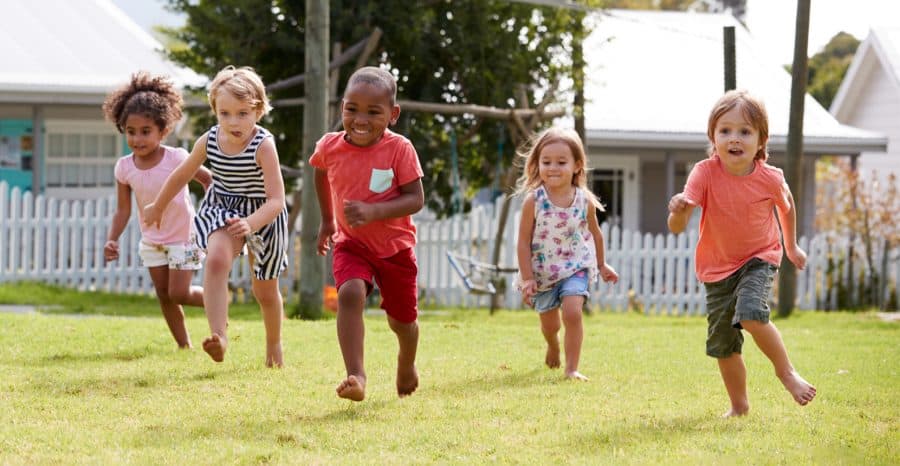Unstructured play, an essential source of happiness for our children, is in jeopardy. For centuries, children have done what comes naturally to them, play! Kids played all day long. They built forts, played tag, and made mud pies. Now, it seems our society wants to rob our children of the benefits of play.

As the demand on our children’s schedules, routines, and responsibilities increase, more than ever, children need to play. Presently, we see an increased focus on academics and structured activities.
As a result, in favor of more academics, schools are eliminating recess. In the past twenty years, our children have lost hours of free time each week, significantly decreasing their amount of play.
Our kids are over-scheduled with multiple organized and adult-led activities. In other words, each moment is structured and supervised with little, if any, time for free play.
Have we forgotten the importance of playtime?
What about the benefits of play and its role in the development of our children?
Let’s protect the unique wonder of childhood and give the gift of play.
Benefits of Play or “Free Play”
Free play, aka “unstructured play,” self-play, or “child-directed play,” allows our children to engage in freely chosen play.
- It is open-ended, giving them the ability and control to explore their interests, passions, and talents.
- It provides the independence to take risks and make mistakes.
- They begin to understand choices and consequences as they learn from their mistakes.
Child-directed play is vital to children learning to understand themselves and those around them.
- Children at play, interact with others, helping them to process their emotions.
- They build their confidence and develop a sense of autonomy.
- Kids learn self-control and how to regulate their feelings
It is a child-initiated play that fosters creativity and nurtures the imagination. As it turns out, more time spent in adult-led activities decreases the opportunity for your child to develop their creativity.
Play helps protect against the effect of pressure and stress. Additionally, when kids actively engage in play, it can promote healthy habits.
Play is so important to the development of our children, that the United Nations “Convention On The Rights Of The Child (1989)“, states in Article 31
…recognize the right of the child to rest and leisure, to engage in play…
Structured Play vs. Unstructured Play
Striking a balance of structured play vs. unstructured play is crucial to raising healthy, happy kids. It can be tricky, as both are valuable ingredients in your child’s development. However, it is the balance that is currently out of sync, and our children’s free play is at risk.
Unscheduled play is spontaneous and adventurous. Furthermore, it is, by nature, process-oriented without a required outcome. While also providing our children with the freedom to explore and make their own choices. Most important, it is enjoyable!
Ultimately, the difference between the two types is the intent of engagement. For example, one comes with a set of instructions, and the other is open-ended.
Structured Play Activities
Structured play is ordinarily adult-led, goal-oriented play with rules and instructions. Some examples of structured play activities include:
- Board games or puzzles
- Building something from a model or set of instructions
- Organized sports teams like soccer
- Enrollment in classes like art, music, or dance
- Coloring in a picture or painting by numbers
Unstructured Play Activities
Unstructured play is child-driven, open-ended, and process-based. A set of rules or instructions does not bind it. In addition, unstructured play does not include screen time (computers, video games, or television). Some examples of unstructured play activities include:
- Building free-form with blocks for kids
- Dress up or pretend play
- Drawing, coloring or painting on blank paper with no examples
- Playground play (free and unorganized)
Raising our children into healthy, happy adults requires plenty of “free play” time. For instance, you can help nurture their unstructured play and creativity with a wooden block set. Additionally, open-ended building sets encourage interaction with others and can build self-confidence.
